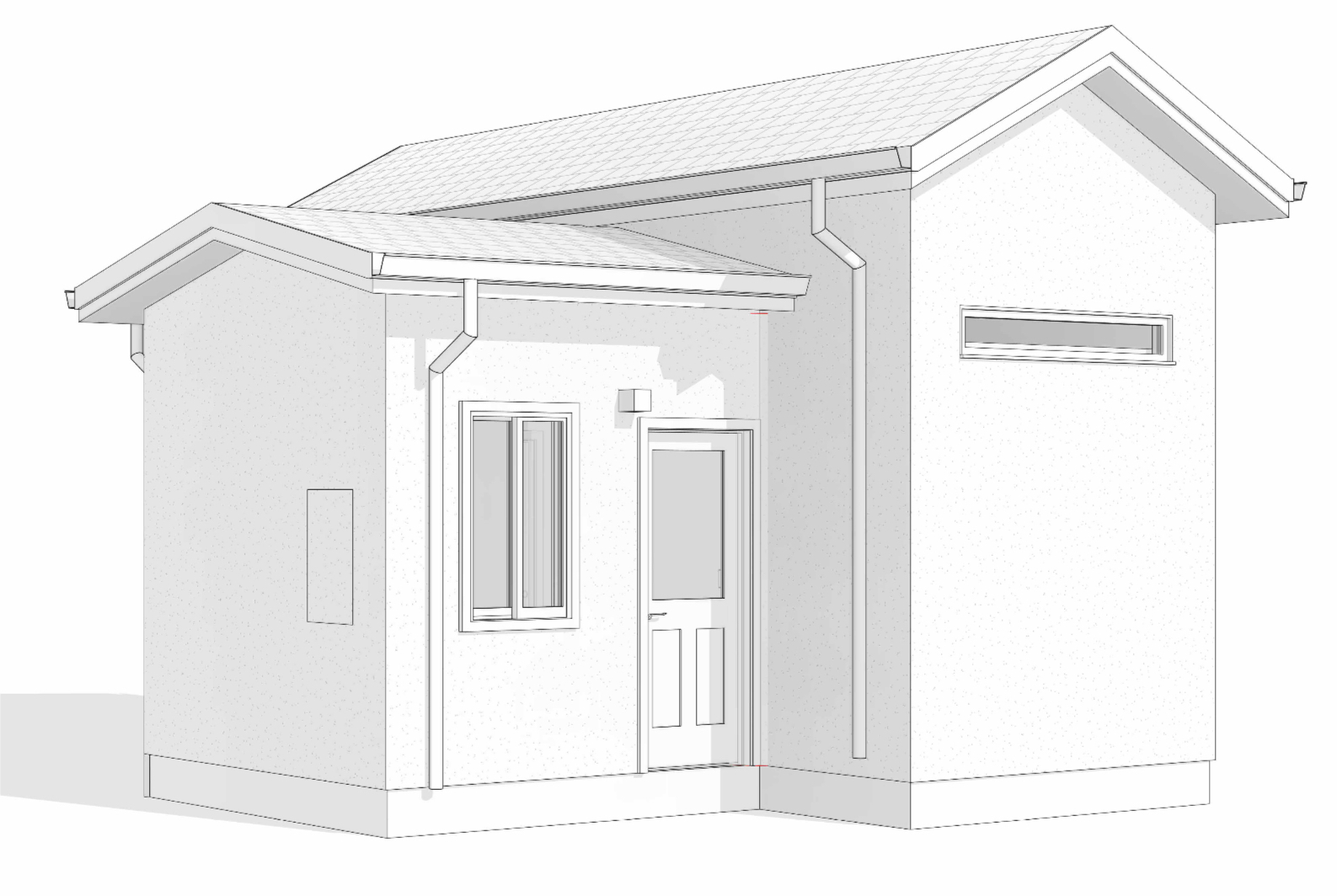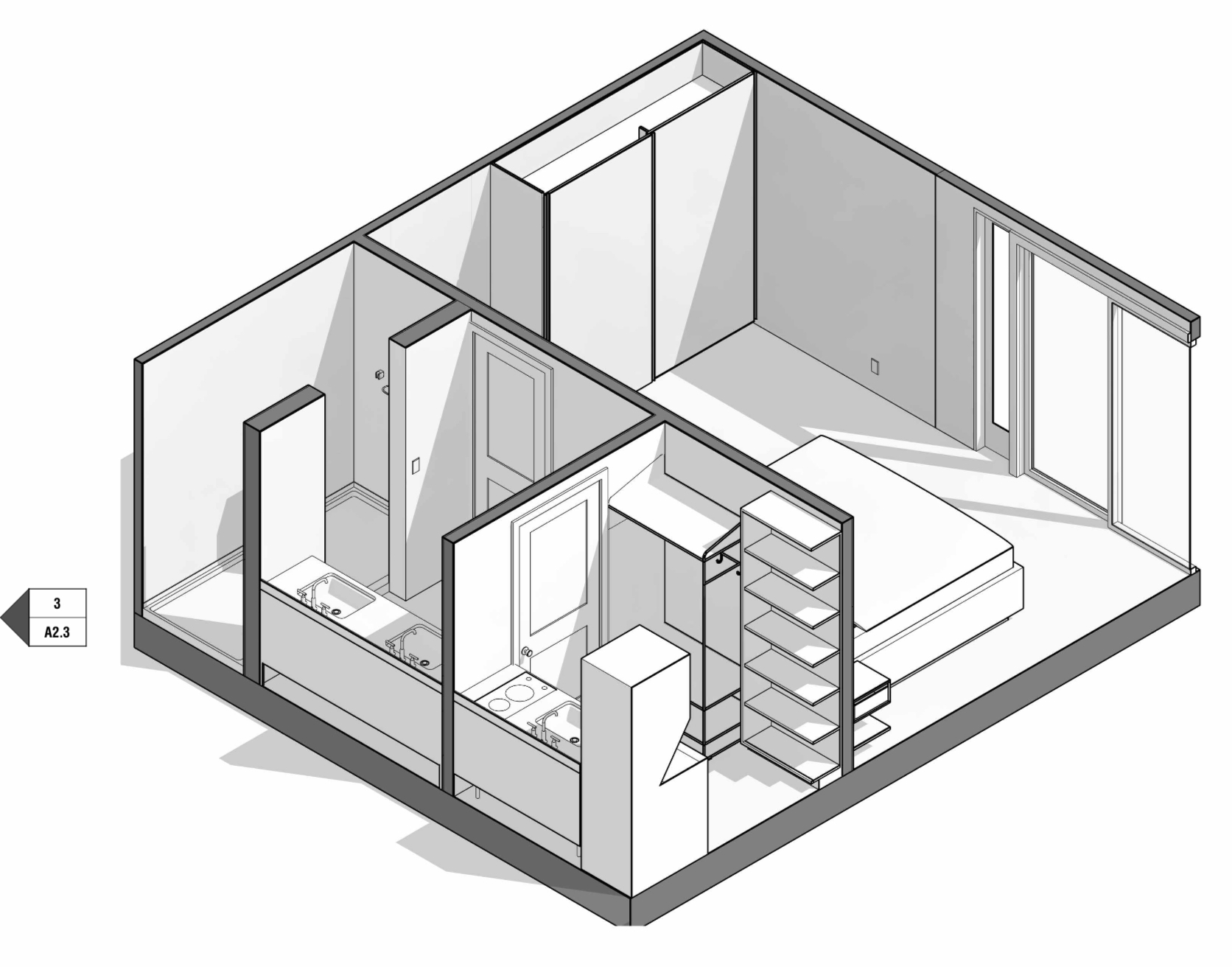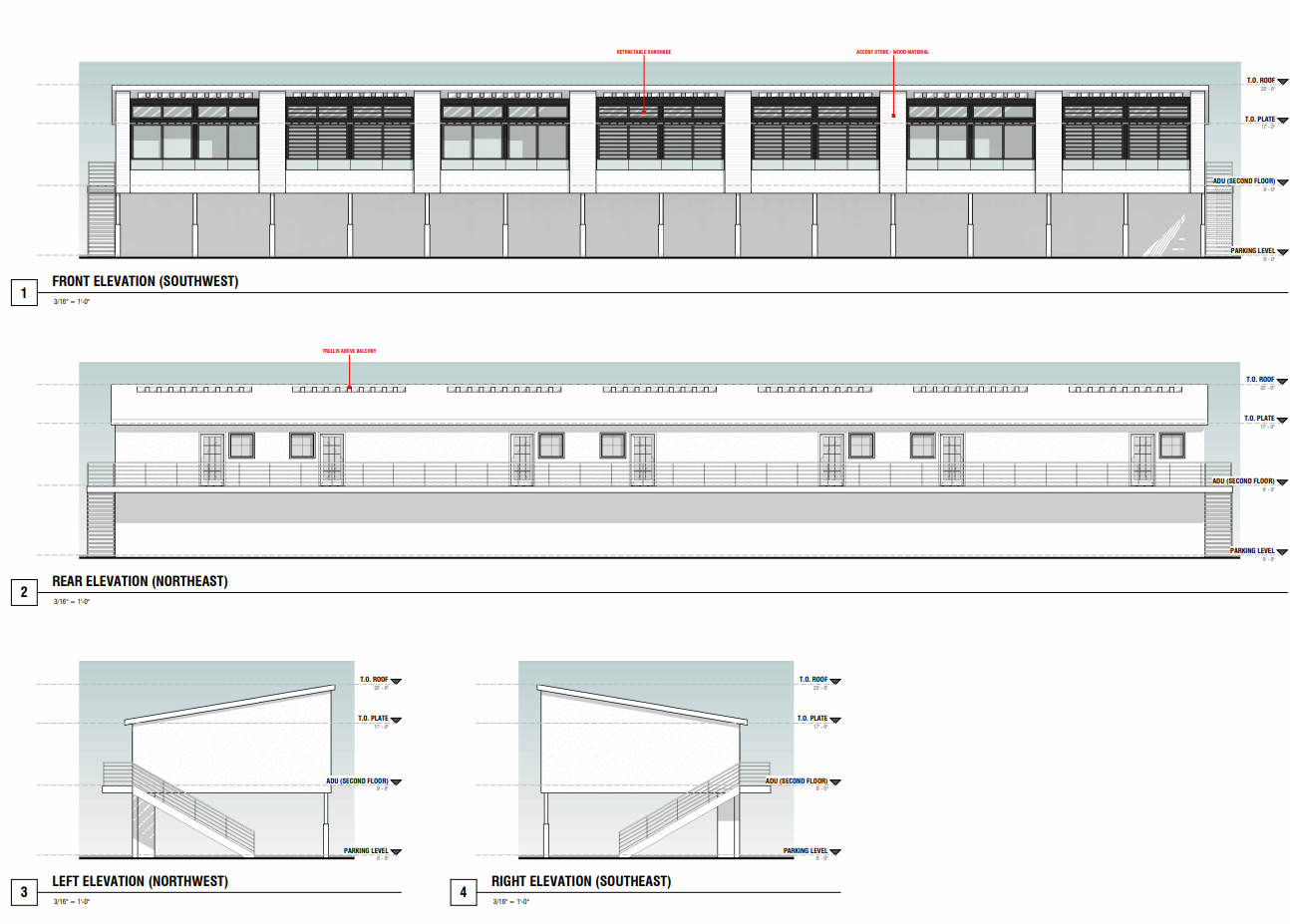Project Overview
A detached accessory dwelling unit (ADU) under 600 square feet is fully legal in the City of Decatur, Georgia. Local zoning allows one ADU per residential lot, and the maximum size for a detached unit is currently 800 sq ft, so this 599 sq ft project is comfortably within code
Project Details
A detached accessory dwelling unit (ADU) under 600 square feet is fully legal in the City of Decatur, Georgia. Local zoning allows one ADU per residential lot, and the maximum size for a detached unit is currently 800 sq ft, so this 599 sq ft project is comfortably within code. Because it is detached and less than the main house, it will be classified as an accessory structure rather than a duplex, simplifying both planning and long-term property taxes.
The floor plan fits two bedrooms, one bathroom and an open living-kitchen area into a compact rectangle. A single exterior entrance at the front satisfies the building department’s life-safety rules, while at least one egress window in each bedroom meets emergency-escape requirements set by the International Residential Code, which Georgia follows. Keeping the kitchen along one wall limits plumbing runs and preserves floor space—a common strategy in sub-600 sq ft ADUs.
Decatur follows Georgia’s residential energy code, so the shell must reach minimum R-values (R-13 or better in walls and R-30 or better in the ceiling) and use high-efficiency windows. Most builders meet the heating and cooling load with a ductless mini-split heat pump, an option that avoids bulky ductwork and keeps utility bills predictable in Atlanta’s hot, humid summers.
Permitting time in the Atlanta metro varies, but four to six months is a realistic range for a by-right detached ADU if plans are complete and no variances are needed. Construction for a wood-frame unit of this size commonly runs three to five months once ground is broken. Recent projects around Metro Atlanta suggest all-in costs often fall between $100 k and $175 k, depending on finishes, foundation type, and site conditions.
For homeowners, a 2-bedroom ADU offers several clear benefits. It can serve as a long-term rental, multigenerational housing, or a future downsizing option while the main house is rented out. In many Atlanta-area neighborhoods, adding a legal ADU also increases resale appeal and overall property value, especially as more buyers look for flexible housing or supplemental income potential.
If you’re considering an ADU in Decatur, start with a zoning check to confirm setbacks, height limits and tree-protection rules. Engage a designer or architect familiar with local plan-review expectations, submit a complete package that includes site plan, structural details and energy-code compliance, and retain licensed contractors who understand Georgia building codes. By following these steps, a 599 sq ft detached ADU can become a high-value asset that meets today’s housing needs and tomorrow’s market demand.


Our Approach
Discovery & Planning
We analyzed the property, zoning regulations, and homeowner goals to create a customized feasibility plan.
Design
Our designers created custom floor plans maximizing space while respecting the budget and aesthetic preferences.
Permitting
We navigated city requirements and handled all paperwork, securing permits efficiently.
Construction
Our licensed contractors brought the ADU to life with premium materials and meticulous attention to detail.
Understanding Detached ADUs
A standalone accessory dwelling unit built separately from the main home, offering maximum privacy and flexibility. This project in Decatur exemplifies the benefits and possibilities of this ADU type, demonstrating how homeowners can maximize their property's potential while creating valuable living space.
Key Benefits
Ideal For
Decatur ADU Market Insights
Decatur is located in Metro Atlanta and represents one of the most dynamic ADU markets in the area. With a population of 24,000 and median home prices of $550,000, the demand for accessory dwelling units continues to grow as homeowners seek to maximize their property value and generate additional income.
Why Build an ADU in Decatur?
ADU Investment Potential in Decatur
Building an ADU in Decatur represents a significant investment opportunity. Based on current market conditions and rental rates in the Metro Atlanta area, homeowners can expect strong returns on their ADU investment. The combination of high rental demand, favorable regulations, and property value appreciation makes this an attractive option for long-term wealth building.
Investment Note: ADUs in Decatur typically pay for themselves within 8-12 years through rental income alone, while also providing immediate property value appreciation. Many homeowners also benefit from tax advantages and depreciation deductions.
Typical ADU Building Timeline in Decatur
Understanding the ADU construction timeline helps homeowners plan effectively. Here's what to expect when building a detached adu in the Metro Atlanta area.
Feasibility & Design
2-4 WeeksSite analysis, zoning verification, initial design concepts, and cost estimation. We assess your property's ADU potential and create preliminary plans.
Architectural Plans
3-6 WeeksDetailed architectural drawings, structural engineering, Title 24 energy compliance, and complete permit-ready documentation.
Permitting
4-8 weeksPermit application submission, plan check review, and approval process. Decatur offers streamlined ministerial review for qualifying ADU projects.
Construction
6-12 monthsFoundation, framing, MEP rough-in, insulation, drywall, finishes, and final inspections. Our licensed contractors manage every phase with quality craftsmanship.
Final Inspection & Move-In
1-2 WeeksCertificate of occupancy, utility connections, final walkthrough, and handover. Your ADU is now ready for occupancy or rental.
Ready to Start Your ADU Project in Decatur?
Get expert guidance on designing and building your own accessory dwelling unit. Our team specializes in Metro Atlanta ADU projects.
ADU Regulations in Decatur
Understanding local ADU regulations is crucial for a successful project. Decatur follows California state ADU laws while implementing local standards. Here are the key regulations that applied to this project and similar builds in the area.
Size Limits
- Detached ADU: Up to 1,200 sq ft
- Attached ADU: 50% of primary home
- JADU: Up to 500 sq ft
- No minimum size requirement
Setbacks
- Rear setback: 4 feet minimum
- Side setback: 4 feet minimum
- No front setback for JADUs
- Conversions: Existing setbacks apply
Height Limits
- Detached: 16-18 feet typical
- 2-story ADUs: Up to 25 feet
- Must not exceed primary dwelling
- Local variations may apply
Parking
- No parking within 1/2 mile of transit
- Garage conversions: No replacement
- JADUs: No parking required
- Tandem parking allowed
Pro Tip: California's ADU laws are updated regularly. Our team stays current on all local and state regulations in Decatur to ensure your project meets current requirements and takes advantage of all available streamlining provisions.
Frequently Asked Questions About ADUs in Decatur
How much does it cost to build an ADU in Decatur?
ADU costs in Decatur typically range from $80,000 for garage conversions to $350,000+ for larger detached units. Factors affecting cost include size, finishes, site conditions, and utility connections. Based on current market rates, a typical detached adu like this project costs approximately $150,000-$350,000.
How long does it take to get ADU permits in Decatur?
Decatur currently processes ADU permits in approximately 4-8 weeks. California law requires cities to approve or deny ADU applications within 60 days. Many jurisdictions, including Decatur, offer expedited processing for standard designs and pre-approved plans.
What is the rental income potential for an ADU in Decatur?
Based on current market rates in Metro Atlanta, a 1-bedroom ADU can rent for approximately $1,600/month, while 2-bedroom units command around $2,100/month. This translates to an estimated annual return of 5.2% on your investment.
Do I need to live on the property to build an ADU in Decatur?
California law prohibits cities from requiring owner-occupancy for ADU permits. You can build an ADU on your property regardless of whether you live there. However, some financing options may have occupancy requirements, and short-term rental rules vary by location.
Can I Airbnb my ADU in Decatur?
Short-term rental regulations vary by city and neighborhood. Decatur has specific rules governing vacation rentals that may require registration, permits, or occupancy requirements. We recommend consulting local regulations and our team can help you understand the options for your specific property.
ADU Services in Nearby Metro Atlanta Areas
GatherADU provides comprehensive ADU design and construction services throughout Metro Atlanta. We serve homeowners in Decatur and surrounding communities with the same expert guidance and quality craftsmanship demonstrated in this project.
Whether you're considering a detached adu like this project or exploring other ADU options, our team understands the unique characteristics and regulations of each neighborhood in the Metro Atlanta area. Contact us to discuss your specific property and goals.
Helpful ADU Resources
Explore our comprehensive ADU resources to learn more about the process, costs, regulations, and design options available to you.
Ready to Build Your Dream ADU?
Let's discuss how we can help you create additional living space, generate rental income, or provide housing for loved ones.



